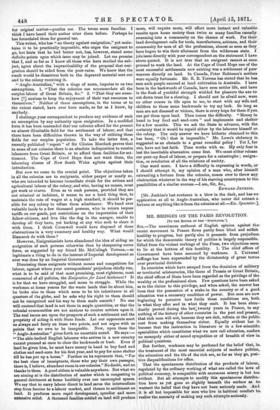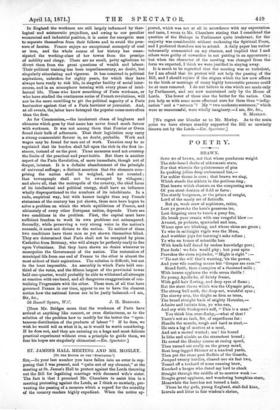MR. BRIDGES ON THE PARIS REVOLUTION.
[TO THE EDITOR, OF TEM "SPECTATOR-"1
Sin,—The unanimous outburst of English opinion against the recent movement in France flows partly from blind and selfish hostility to progress, but partly also it proceeds from prejudices. for which the democratic theory of politics is largely responsible..
Sifted from the violent verbiage of the Press, two objections seem to lie at the bottom of this hostility. 1. The chief offices of Government have been assumed by workmen. 2. Universal suffrage has been superseded by the dictatorship of great towns. over provincial districts.
In countries which have escaped from the dominion of military or territorial aristocracies, like those of Prussia or Great Britain,, the chief offices of State have been regarded as the privilege of the wealthy or the professional class. Few questions have been asked. as to the claims to this privilege, and when asked, the answer has been that the possession of a stake in the country or of a good..
educationwas a necessary condition of power. But men are now beginning to perceive how futile these conditions are, both_ in what they offer and in what they omit. It has been abun- dantly proved during the last,' twenty years in France, to say nothing of the history of other countries in the past and present, that rich men will not, because they are rich, refrain at the public, cost from making themselves richer. Equally evident has it. become that the instruction in literature or in a few scientific_ specialities which constitutes what we now call education, confers. no monopoly either of sound sympathies or of breadth of view in. political questions.
But further, workmen may be pardoned for the belief that, in,. the treatment of the most essential subjects of modern politics,. the education and the life of the rich are, so far as they go, posi- tive disqualifications for office.
That the spontaneous distribution of the products of labour,, regulated by the ordinary working of what are called the laws of political economy, is compatible with enormous misery is but too. evident. But all attempts to modify this spontaneous distribu- tion have as yet gone so slightly beneath the surface as to. warrant the belief that they have not been seriously made. And_ it is all but impossible for men who live in habitual comfort to. realize the necessity of making any such attempts seriously.
In England the workmen are still largely influenced by theo- logical and aristocratic prejudices, and owing to our peculiar economical and industrial position, it is easier for energetic men to separate themselves from their fellows and to avoid the pres- sure of famine. France enjoys no exceptional monopoly of coal or iron, and the whole course of her history has eman- cipated the working-class of her towns from the prestige of nobility and clergy. There are no small, petty agitations to divert them from the great questions of wealth and labour. Their political training has been unparliamentary, no doubt, but singularly stimulating and vigorous. It has consisted in political aspirations, unbroken for eighty years, for which they have always been ready to risk life, in singular facility of social inter- course, and in an atmosphere teeming with every phase of intel- lectual life. Those who know something of Paris workmen, or who have studied the continuous series of French revolutions, will not be the more unwilling to pit the political sagacity of a Paris bootmaker against that of a Paris barrister or journalist. And, at all events, the latter have betrayed the popular cause more often than the first.
As for Communism,—the incoherent chaos of bugbears and chimeras which goes by that name has never found much favour with workmen. It was not among them that Fourier or Owen found their bulk of adherents. That their legislation may carry a strong communistic flavour is, no doubt, probable. Work and wages may be found for men out of work. Taxation may be so regulated that its burden shall fall upon the rich in the first in- stance, instead of on the poor. These measures need not overstep the limits of the practical and practicable. But there is another aspect of the Paris Revolution, of more immediate, though not of deeper, interest. It is a definite abandonment of the principle of universal suffrage; a distinct assertion that the elements com- prising the nation shall be weighed, and not counted ; that townspeople shall not be swamped by villagers ; and above all, that the metropolis of the country, the chief focus of its intellectual and political energy, shall have an influence wholly disproportioned to the numbers of its inhabitants. In a rude, empirical way, but with keener insight than any French statesman of the century has yet shown, these men have begun to solve a problem on which the whole equilibrium of France, and ultimately of every other European nation, depends. There are two conditions in the problem. First, the capital must have sufficient freedom to work its own problems out unhampered. Secondly, while preserving a very strong voice in the nation's counsels, it mast not dictate to the nation. To neither of these two conditions have these men as yet shown themselves blind. They are determined that Paris shall not be occupied by pious Catholics from Brittany, who will always be perfectly ready to fire upon Yoltairians. But they have shown no desire whatever to monopolize the Government of the nation. The restoration of municipal life from one end of France to the other is almost the most ardent of their aspirations. The solution is difficult, but not in the least impossible. An assembly in which Paris held one- third of the votes, and the fifteen largest of the provincial towns held one-quarter, would probably be able to withstand all attempts at reaction with one hand, and all dangerous exaggerations of cen- tralizing Progressists with the other. These men, of all that have governed France in our time, appear to me to have the clearest notion how the national forces are to be justly balanced.—I am, Sir, &c.,
[Does Mr. Bridges mean that the workmen of Paris have arrived at anything like concert, or even distinctness, as to the solution of the problem how to modify for the better the " spon- taneous distribution of the products of labour " ? If he does, we wish he would tell us what it is, as it would be worth considering. If he does not, and they are entering on a huge and most delicate practical experiment without even a principle to guide them, we fear his hopes are singularly chimerical.—ED. Spectator.]



































 Previous page
Previous page